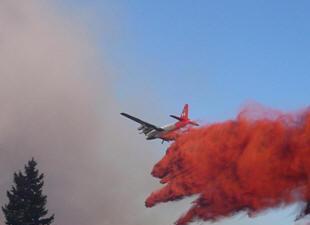|
|||||||||||||||||
|
|
|
|||
|
P-2 Airtanker Wing
Inspections Clears Fleet For Aerial Wildfire Deployment By Steve Hall |
||||
 |
February 13, 2012 - Neptune Aviation, the country's
biggest operator of large airtankers, reports that its
fleet of ex-Navy P2V Neptunes remains wildfire
mission-ready, following the discovery of a crack in the
left wing of one of its tankers during a routine
scheduled inspection in late January of this year.
Although that one airtanker remains out of service
pending an engineering evaluation, the remaining nine
P2Vs were never grounded--thanks to quick action by the
operator.
"We were the ones who discovered the problem and
notified the FAA's Flight Standards District Office
(FSDO) in Helena, MT, and at the same time filed a
Service Difficulty Report through the FAA's electronic
reporting system," said Dan Snyder, President of the
Missoula-based company.
|
|||
|
"We then
developed inspection criteria, which we took to the FAA's
Aircraft Certification Office (ACO) in Denver after we had
inspected our entire fleet. The ACO asked us to provide the
details of our inspection criteria, and then used that as the
basis for the emergency airworthiness directive (AD), which was
issued for all P2V operators in the US."
Snyder
added that Neptune continues to work closely with the Helena
FSDO, the Denver ACO, and the Seattle Transport Directorate by
providing technical expertise and factual data at their request.
"The resulting emergency AD includes much of this input as a
basis for issuance."
Under the
AD, all P2V Neptunes in the US were to be inspected within 24
hours of the directive's February 6, 2012, release date. The
inspections specifically focused on the wing skin, spar, and web
near the wing box--the structure which joins the wing to the
fuselage. Since inspections of Neptune's nine other airtankers
did not indicate a similar problem, airtanker capacity for the
coming fire season is essentially unchanged. Snyder pointed out that Neptune's maintenance and inspection criteria are in full compliance with the approved Continuous Airworthiness Program (CAP), implemented by Neptune, and mandated by the US Forest Service (USFS) in 2004. "Neptune Aviation has always been at the forefront of dealing with the aging aircraft issues involved with the current tanker fleet. The fact that we detected this problem before it led to a catastrophic failure indicates that the CAP is doing its job," he said. |
||||


